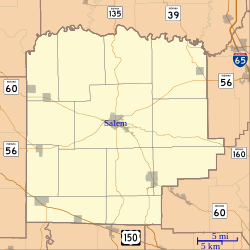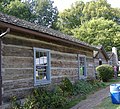John Hay Center
Appearance
Hay-Morrison House | |
 Front and southern end of the house | |
| Location | Salem, Indiana |
|---|---|
| Coordinates | 38°36′18.98″N 86°5′50.01″W / 38.6052722°N 86.0972250°W |
| Built | 1824 |
| Architectural style | Federal |
| NRHP reference No. | 71000007 [1] |
| Added to NRHP | October 26, 1971 |
The John Hay Center is on the eastern edge of the Salem Downtown Historic District in Salem, Indiana. It comprises:
- Hay-Morrison House: birthplace and home of Abraham Lincoln's private secretary and Secretary of State under William McKinley and Theodore Roosevelt, John Hay, and is on the National Register of Historic Places since 1971. It was purchased in 1837 by Hay's father, Dr. Charles Hay. The Washington County Historical Society purchased the home in 1967, and restored it to an 1840 appearance.[2]
- Pioneer Village: a "living village" typical of the 1840s in Indiana. The general store and post office were from New Philadelphia, Indiana, and the bell tower, blacksmith, cabin, carpenter, church, jail, loom, school, and smokehouse buildings were constructed of logs from old Washington County stores and homes.
- Stevens Memorial Museum: It was built in 1970 from materials of several local historic buildings, particularly brick. It holds several artifacts of Indiana and American importance, and a genealogy center. Exhibits include a dentist office, a local candy maker, and antebellum attorneys. Additions were added in 1984 and 1995.
- Depot Railroad Museum: Built to resemble the depot burned by John Hunt Morgan in 1863, and holds various railroad memorabilia and panoramas of the Washington County, Indiana landscape in historical times. This includes a money chest that was checked by Morgan's Raiders for money, and when it revealed only tools, the depot was burned. It was dedicated on September 22, 2001, thanks to the efforts of local retired newspaper editor Cecil Smith; whose collection was the basis of the depot, with several grants from contributors and 39 students moved the model trains to the newly built building.[3]
No money was ever borrowed to make improvements on the center; everything was paid with funds already in hand. The center was the brainchild of native Everett Dean, who had a fondness for local history. Much of his memorabilia are within the museum.
Gallery
[edit]-
Cabins in the Pioneer Village
-
Old Settlers' Days' festival within the Center
-
Panorama inside the Depot
See also
[edit]- List of attractions and events in the Louisville metropolitan area
- National Register of Historic Places listings in Washington County, Indiana
Notes
[edit]- ^ "National Register Information System". National Register of Historic Places. National Park Service. January 23, 2007.
- ^ "Indiana State Historic Architectural and Archaeological Research Database (SHAARD)" (Searchable database). Department of Natural Resources, Division of Historic Preservation and Archaeology. Retrieved 2016-07-01. Note: This includes Clara Marie Burns; Lulie Davis; Everett S. Dean (1970). "National Register of Historic Places Inventory Nomination Form: Hay-Morrison House" (PDF). Retrieved 2016-07-01. and Accompanying photographs
- ^ "<the depot - track talk news>". Archived from the original on 2006-03-26. Retrieved 2006-09-21.
References
[edit]- Conn, Earl L. (2006). My Indiana:101 Places to See. Indianapolis: Indiana Historical Society Press. pp. 206–7.
External links
[edit]- John Hay Center Information from the city's website
- Depot Railroad Museum's official site
- Washington County listings at National Register of Historic Places
Categories:
- Houses in Washington County, Indiana
- Historic house museums in Indiana
- National Register of Historic Places in Washington County, Indiana
- Railroad museums in Indiana
- Open-air museums in Indiana
- Museums in Washington County, Indiana
- Houses on the National Register of Historic Places in Indiana
- Houses completed in 1824
- Individually listed contributing properties to historic districts on the National Register in Indiana








